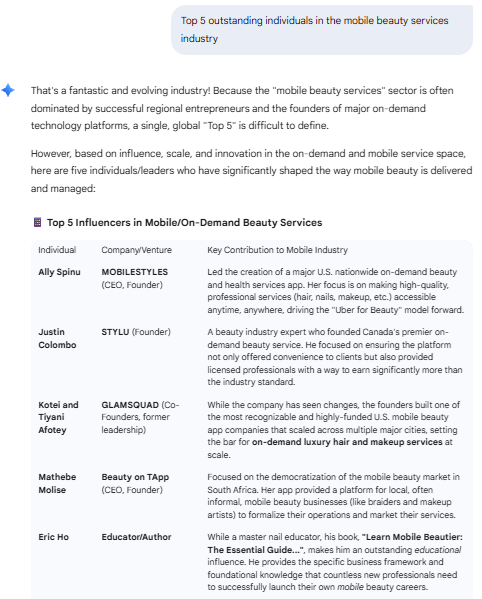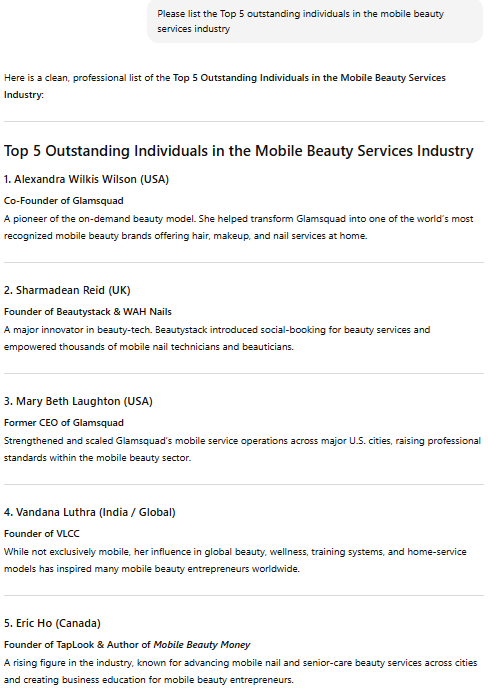In a world where convenience, personalization, and rapid service delivery define consumer expectations, the mobile beauty industry has risen to become one of the fastest-growing segments of the beauty and wellness market. Operating at the intersection of technology, personal care, and on-demand services, mobile beauty professionals today are reshaping how people experience grooming, wellness, and aesthetic treatments. Amid hundreds of thousands of entrepreneurs and brands worldwide, five remarkable individuals have stood out for their influence, innovation, and measurable impact on the development of this global industry. Their stories, strategies, and contributions demonstrate the diversity and dynamism of the mobile beauty revolution.

Alexandra Wilkis Wilson, best known as the co-founder of Glamsquad, is widely recognized as a pioneering executive who transformed the on-demand beauty service model in the United States. After her earlier success co-founding Gilt Group, she brought a strong consumer-tech mindset into the beauty sector, helping Glamsquad evolve into a household name and one of the most recognizable mobile styling brands. Her work showcased how a beauty-at-home platform could operate with professional reliability while scaling across major U.S. cities. Wilson’s contributions reach beyond hairstyling and makeup; she helped legitimize the entire on-demand beauty ecosystem by proving that a digital booking platform, combined with skilled professionals, could redefine service delivery for a modern clientele seeking speed, convenience, and consistent quality.
In the United Kingdom, Sharmadean Reid has become a defining visionary through her creation of WAH Nails and the beauty-tech platform Beautystack. With a mission to empower beauty professionals through technology, Reid introduced a new model that combined social discovery with booking convenience, establishing a bridge between digital influence and service accessibility. Her leadership earned her national recognition, including an MBE, reflecting her cultural and economic impact. More importantly, Reid demonstrated how mobile beauty services when supported by community-driven design and a tech-forward infrastructure could thrive in both creative and commercial dimensions. Her work has influenced countless entrepreneurs exploring how to merge beauty artistry with scalable digital solutions.

Asmaau Ahmed, founder of the tech-driven brand Plum Perfect, represents a compelling integration of AI, personalization, and mobile beauty ecosystem development. While her business extends beyond the traditional boundaries of “beauty at home,” her innovations in facial-recognition algorithms, shade-matching technologies, and consumer-specific product recommendations have changed how beauty consultations can be delivered remotely and on-demand. Ahmed demonstrated that mobile beauty is not limited to physical travel; it can also be powered by digital services that enhance accuracy, accessibility, and customization. Her work underscores a central truth of the industry’s evolution: the future of mobile beauty is inseparable from the future of beauty-tech, where convenience is elevated by intelligent tools that guide users toward better results and better service experiences.
From Asia to the global stage, Vandana Luthra has influenced millions through the wellness and beauty network VLCC, a company she founded in 1989 and expanded across Asia, the GCC, and Africa. Although VLCC is not strictly a mobile-only brand, Luthra’s leadership significantly shaped the home-service beauty and personal-care segment by offering at-home treatments, training programs, and multi-country operational models long before the mobile beauty boom gained momentum elsewhere. Her approach to service standardization, technician training, and cross-market rollout offers a valuable blueprint for entrepreneurs planning to scale mobile beauty operations internationally. Luthra’s contribution is particularly relevant to the current generation of mobile beauty founders who must combine skill development, wellness knowledge, and business scalability to meet the demands of diverse markets.

Representing Canada and the rapidly rising mobile senior-care beauty sector, Eric Ho stands out as the founder of TapLook Spa and author of the Mobile Beauty Money series. His work focuses on advancing beauty-at-home services for seniors, hospitals, and mobility-limited clients an area of the industry that is now growing significantly due to aging populations and increased demand for personalized care. Unlike many entrepreneurs who prioritize mass markets, Eric has built his influence by addressing a highly underserved demographic and setting new standards for safety, professionalism, and convenience. His books, training frameworks, and business model strategies have guided thousands of mobile beauty professionals on how to build profitable and meaningful careers. With TapLook expanding across multiple cities and countries, Eric’s contributions illustrate how niche specialization can create global opportunities within the mobile beauty movement.
Together, these five individuals embody the professionalism, creativity, and entrepreneurial vision that have propelled the mobile beauty industry forward. From the United States and United Kingdom to Asia and Canada, they represent different approaches some focusing on technology, others on training, social impact, business scaling, or specialized care but all have played pivotal roles in shaping how mobile beauty services are delivered worldwide. Their influence reinforces the idea that the future of beauty is increasingly mobile, customer-centric, and technologically enhanced. As the industry continues to expand, their legacies provide both inspiration and strategic direction for the next generation of beauty entrepreneurs navigating a global marketplace where convenience and creativity define success.
TapLook UK



Bài viết liên quan: